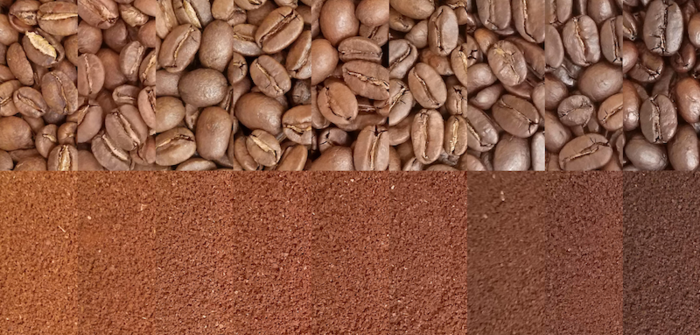
Some coffees have distinct cuts where at certain points you get a big, distinct change in cup character, so you have maybe 2-4 categories of general characteristics you can aim for and manipulate the roast within, and those are interesting in their own way, but here it's really all just levels and intensities shifting and deciding what kind of balance you want.
Today I'm working on my latest arrival from Brazil and the initial exploratory roast would make for a pretty interesting training exercise. I have 9 cups, each representing a different potential end point ranging from start of 2nd crack through to a bit beyond what I'd like as a French Roast, and within that, the core characteristics of the coffee are remarkably stable, which makes it a good example of what you can generally expect as coffee gets darker.
Odds are good that Typica 2.0 will have a significant change to its main serialization. Most won't have to care about the difference, but it's both a significant reduction in file size and nicer for anybody doing by hand edits (though now that CRUCS exists, nobody should be doing that). Main downside I can think of is it'll break any XSLT workflows, but as far as I know, nobody is doing that. Might be worth asking the mailing list if it'll affect anybody anyway.
@dansup It's because the forks are all created by cats and of course cats are going to fork the thing that has a "user is a cat" setting.
Finally landed a new personal best for damage with Qiqi's elemental skill. Was hoping to push it a bit higher than I did, but it's still a significant improvement over my previous best. Still need to review the recording to pull out an exact number, but it's substantially over 200K vs my old personal best of 174K.
The credit card terminals have recently developed a problem where sometimes overnight they go mad and apparently the solution is to go into Setup on both machines, change one of the settings to the wrong thing, save that, and then set it back to the right thing and save again. I'm not going to say I don't understand how that could happen because I've introduced suspiciously similar bugs in my own code over the years, but it would be nice if someone would take a look at that and fix it.
The darkest thing on my tasting list today is a new lot from Sulawesi. A roaster friend who enjoys dark roasts and has been looking forward to this thinks, just based on the Agtron numbers, that I may have pushed this one a bit too far, but tasting it, it's come out quite nice. There's a lot of body, some nice dark spice notes. I might push the end a little faster for the next batch to maybe get a little more sweetness back, but I do like how this turned out as is.
Next up is a Fair Trade Certified decaf Sumatran coffee. This doesn't taste as dark as it measures, but is coming in sort of right on the edge between what I'd consider a medium and a dark roast. Will probably label it a dark roast since anybody sticking it in a degree of roast analyzer and looking at the number would put it there regardless of how it tastes. This is going to have to be my most expensive decaf.
I feel like this is one of the more accessible Kenyan coffees I've had recently because there's still a lot of flavor to it, but it's not punching you in the face with it.
Moving a little darker but still in the range that I'd consider a light roast is the new Kenya AA. Here I made a couple plan tweaks against the initial exploratory work (CRUCS makes that sort of tweaking so much easier, definitely worth the time I invested into porting that to the web). Here I wanted to bring the sweetness up a little more and moderate the acidity. It's not a total acid bomb but still vibrant with floral aromatics, super juicy.
- Software
- https://typica.us
- Send Money
- https://typica.us/payment.html
Author of Typica software for coffee roasters.
